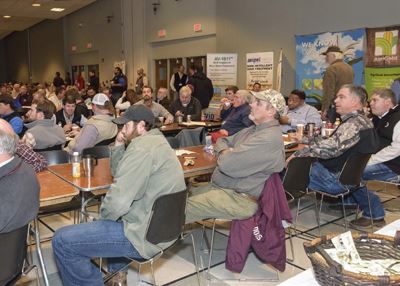MSU Short Course Brings Record Attendance
MISSISSIPPI STATE, MISS.
A record number of agriculture professionals attended Mississippi State University’s 2014 Row Crop Short Course, which has rapidly become one of the region’s top educational opportunities.
The workshop was held Dec. 1-3 in Starkville and brought together more than 440 farmers, crop advisers, university experts and industry representatives. It was offered by the MSU Extension Service.
Topics included insect management, herbicide-resistant weed control, seed treatments, on-farm precision agriculture applications, irrigation efficiency and the farm bill. Several sessions looked at specific topics related to the state’s major row crops.

A record number of agriculture professionals attended the Dec. 1-3 Row Crop Short Course offered in Starkville by the Mississippi State University Extension Service.
Photo by MSU Ag Communications/Kevin Hudson
Darrin Dodds, Extension cotton specialist and event coordinator, said the short course is designed to be relevant and valuable to the producers of the region.
“We go to whatever lengths we can to make everything first class,” Dodds said. “Growers have worked all year, and when they finally get out of the field, they would like to hunt or fish or take it easy. We do everything we can to make this a worthwhile use of their time.”
Each year, the short course brings in growers from across Mississippi and from the surrounding states. Speakers include experts from MSU and other universities, as well as industry leaders and farmers. Speakers from seven different states were on the program at the 2014 Row Crop Short Course.
The Row Crop Short Course is always held the first week of December to take advantage of the narrow window of time between the conclusion of fall harvest activities and the beginning of equipment maintenance, planting decisions and spring land management.
As always, a variety of certified crop adviser credits were available, including some in soil and water management and nutrient management, which are not readily available. ∆